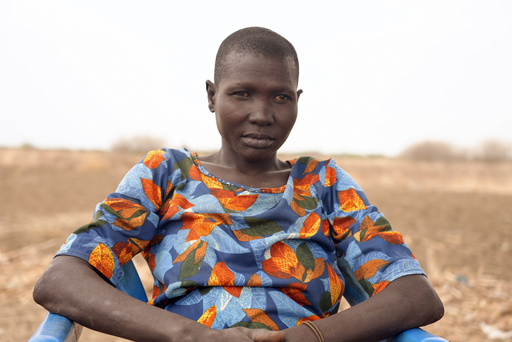JARWENG, South Sudan — Nobel Prize laureate Jimmy Carter dedicated nearly four decades to the fight against Guinea worm disease, an age-old affliction impacting some of the world’s most impoverished communities. Although the disease is rarely fatal, it is incredibly painful and debilitating. Infection occurs when individuals consume water contaminated with larvae, which develop into long, thin worms—sometimes extending up to three feet in length. These parasites exit the body through painful blisters, causing intense suffering.
Carter prioritized the eradication of Guinea worm disease as a fundamental goal for The Carter Center, the organization he co-founded with his wife, Rosalynn, after his presidency. He united health professionals, wealthy benefactors, heads of state from various African nations, and countless local volunteers to strive towards the elimination of this disease, marking only the second time a human illness could be eradicated in history.
Carter expressed in 2016 that achieving this goal would be a significant and fulfilling milestone in his life. Even while receiving hospice care in February 2023, he consistently requested updates on the status of Guinea worm disease from his aides. He passed away on Sunday at the age of 100.
Through the efforts spearheaded by the Carters, the number of people afflicted with Guinea worm disease has drastically decreased from an estimated 3.5 million cases in 20 African and Asian countries, when the eradication campaign began in 1986, to just 14 recorded cases across four African nations in 2023, as reported by The Carter Center. The World Health Organization aims to eliminate this disease by 2030, with hopes from Carter Center leaders to achieve that goal even sooner.
Recently, the campaign returned to Jarweng, a remote village in northeastern South Sudan that had remained free of infections since 2014. Unfortunately, Nyingong Aguek and her two sons became infected after consuming contaminated water during their travels in 2022. A fourth individual also contracted the disease. “Having the worm pulled out is more painful than giving birth,” Aguek stated, showing the scars from four worms that emerged from her leg.
To combat the disease, Carter Center staff and volunteers have been proactive in distributing water filters and offering education on inspecting dogs, who can also carry the parasite. Villager Mathew Manyiel remarked, “If someone’s hurt, The Carter Center will help,” while participating in a training session about recognizing symptoms in dogs.
The campaign began in the mid-1980s when global health organizations were focused on other priorities, largely neglecting Guinea worm disease that affected millions. Carter’s commitment to tackling the issue gained momentum with the support of public health experts from his administration who believed this disease could follow smallpox to eradication. Dr. William Foege, who led the U.S. Centers for Disease Control’s smallpox eradication program, emphasized the importance of Carter’s political influence in catalyzing global health initiatives.
Carter’s personal experiences growing up in a rural Georgia farmhouse likely deepened his empathy for the farmers suffering from Guinea worm. Dr. Donald Hopkins, an architect of the eradication campaign, noted that the former president understood the debilitating effects the disease had on those unable to work due to illness.
There is no vaccine or effective medication for Guinea worm disease, with treatment methods remaining largely unchanged for centuries. The approach has depended on educating communities to change their behaviors, such as filtering water and reporting infections. By breaking the life cycle of the parasite, the goal is to eliminate Guinea worm altogether in endemic areas.
The success of this campaign has inspired similar initiatives against other neglected tropical diseases, enabling 22 countries to eradicate at least one disease. In May 2023, Mali was confirmed to have eliminated trachoma, a blinding eye infection, while Haiti and the Dominican Republic aim to eradicate malaria and lymphatic filariasis by 2030.
Carter’s presence as a former president significantly enhanced fundraising efforts for The Carter Center, allowing it to invest around $500 million in combating Guinea worm disease. His visits to afflicted areas often generated media attention, raising awareness and support for the cause. Carter’s firsthand encounter in 1988 with the severity of Guinea worm disease while visiting a Ghanaian village profoundly impacted him, highlighting the urgent need for action.
In 1995, amidst a civil war in southern Sudan, Carter played a crucial role in negotiating a ceasefire that enabled aid workers to reach remote areas, distributing 200,000 water filters and discovering additional villages affected by the disease. This initiative fostered trust among communities, producing significant peace dividends, according to local health officials.
The campaign saw various successes; Pakistan was the first endemic country to report zero cases in 1993, followed by India, and by 1997, the disease was eliminated from Asia. However, setbacks frustrated Carter as the disease resurfaced in Ghana in 2007. His public criticisms prompted a renewed push for action, resulting in a successful cessation of transmission within three years. Nigeria, once the country with the highest number of cases, reported zero infections in 2009—a major victory in the fight against the disease.
Carter’s determination remained strong even after his cancer diagnosis. He famously expressed a wish for the last Guinea worm to perish before he did. Despite the commendable progress made, challenges persist, particularly in regions affected by civil strife and environmental disasters, such as the reported cases in Chad, where canine infections complicate eradication efforts.
The campaign leverages around 30,000 volunteers across approximately 9,000 villages to maintain vigilance. As cases diminish, the task becomes more challenging; however, the commitment to achieving the 2030 eradication goal continues to be unwavering among Carter Center officials. “We aim to meet this timeline,” emphasized Adam Weiss, who has directed the eradication campaign since 2018, asserting the center’s ongoing commitment to this goal.
This recent report has clarified that there were 14 human cases of Guinea worm disease documented across four African nations in 2023.



